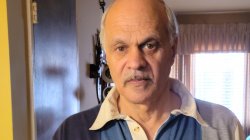Sanford (“Sandy”) Shevack ’08 MA
Hometown Hero is Transformational Leader
Posted in:

Sanford (“Sandy”) Shevack ’08 MA is a community-building powerhouse.
Shevack, New Jersey’s 2020 BD Paterson Patriot Jefferson Award recipient, has an impressive roster of community improvements to his credit. The five buildings he renovated – four in Passaic and one in Paterson – provide 15 affordable housing units as well as space for two preschools and the Bella Chanel Mentoring Program for young women. Rental income from the properties create sustainability, helping to underwrite much-needed youth empowerment initiatives.
Through Shevack’s leadership, 11 human rights themed murals grace the Paterson-Passaic community as well. A 12th mural, “Girls Changing Our World,” is in the planning stages. It will feature Emma Gonzalez, Simone Biles, Malala Yousafzai and Greta Thunberg. In addition, Shevack secured grant funding to build a children’s playground at Kidz University Preschool in nearby Garfield.
Shevack’s accomplishments have gained notice worldwide, and a who’s who of global NGO leaders have visited his programs, including Guatemalan activist Rigoberta Menchú, Liberian peace activist Leymah Gbowee, and Jody Williams, an American who helped found the International Campaign to Ban Landmines. “They heard about the murals and wanted to talk with students here,” he says, noting that other visitors to his programs have included Keith Beauchamp, producer and director of The Untold Story of Emmett Louis Till, and former Black Panther Charlotte O’Neal.
Following Menchú’s visit, he helped obtain grants for nine NGOs in Guatemala to construct three schoolhouses. “You can’t just build schools and walk away,” he advises, noting his efforts to secure additional grants to help ensure an adequate supply of fresh water for the schools and their communities. “It is an ongoing effort to make sure that they thrive.”
Shevack’s portfolio of community work was already well established before he decided to pursue a master’s degree at Montclair. In fact, it was the depth of his life experience that inspired the push to return to school, and to consider becoming an educator in his field.
“Friends kept encouraging me to get my master’s degree, and to teach at the college level,” Shevack says. “I had already earned a few graduate credits at Montclair to qualify for a New Jersey School Social Worker license. I loved the quality of teaching and learning here, and I loved the fact that I could focus my studies on Child Advocacy and Policy.”
Shevack began the program with some trepidation, knowing that he would have to juggle his nonprofit endeavors with the rigors of graduate-level study, but he was ready for it. “It was intense, but I really enjoyed the courses and projects,” he says.
In the years since he has completed his master’s, Shevack has added faculty member to his resume, teaching sociology courses at Montclair, Ramapo College and Bergen County Community College. His lived experiences provide invaluable lessons to students who are preparing to take on leadership roles in their communities.
“Surprises are always around the corner,” he notes. “For example, in February 2008 the factory building that was the site of one of our murals, Heroes of Our Hemisphere, burned down. Thankfully no one was hurt but the mural, which was on the exterior of the factory, was demolished. By June of that year, we raised enough money to reconstruct the entire mural on another building in the neighborhood!”
Shevack sees his faculty role as more than preparing the next generation of community leaders, however.
“Teaching at Montclair is actualizing the belief that universities and communities need to collaborate, especially for the benefit of poor communities,” he explains. “We have an opportunity to help kids from disenfranchised communities understand the importance of post-high school education, both college and vocational, to full participation in the economy.”
Shevack draws on the University’s resources for his programs. For example, the Bella Chanel Mentoring Program brings its young students to the George Segal Gallery and arranges for them to participate in campus-wide Martin Luther King, Jr. Service Day activities. Montclair professors have provided the Bella Chanel program with instruction in topics ranging from West African music, dance and culture to the criminal justice system. Before the pandemic, Montclair sororities sponsored a holiday party for Bella Chanel students.
“These connections serve as an invitation into the process,” he adds. “Everyone our Bella Chanel mentees come into contact with on campus is so open and welcoming to them. They feel like they are part of the University community.”
Shevack points out another aspect of Montclair’s role as a safe space where communities can connect and learn from each other. “For a lot of students, Montclair provides their first experience with diversity,” he says. “Students from a wide variety of backgrounds come together here, and they find a learning environment that promotes respect for diversity.”
Hardly one to rest on his laurels, Shevack is launching the Community Based Violence Intervention Program, an intensive, short-term program for at-risk youth at two sites in Paterson and Passaic. The program, funded through a grant from the New Jersey Office of the Attorney General, creates a coalition of professors, ex-offenders and police officers to provide guidance, education and encouragement for 40 boys and girls.
He also has plans to promote the research findings he developed as part of earning an Ed.D. from National American University. “My dissertation was focused on the path from prison to college,” he says. “It demonstrates the value of expanding educational opportunities for those in prison. Inmates who receive college education rarely return to incarceration. The more opportunities they can access, the better society will be in the long run. I hope that my work in this area will result in policy changes.”
Shevack is pleased to learn about the many new avenues of research taking hold at Montclair as well. “We need research-based practices that will produce results,” he says. “Through research, universities have an important opportunity to promote policies that will create a better country, and a better world.”
